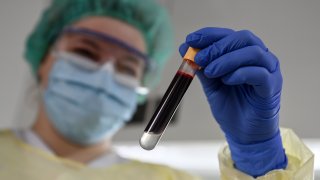
- A new method for identifying illness from blood samples could have seismic implications for the multi-billion dollar diagnostics testing sector.
- Covid-19 has placed unprecedented attention on the importance of fast, reliable medical tests.
- Scientists are working on low-cost, rapid technology combining genes and immunology to identify diseases.
One morning last May, Tayah Fernandes's mother Shannon realized her four-year-old daughter was seriously unwell, and rushed her to the nearest ER in the English city of Manchester. The coronavirus had crashed onto Britain's shores weeks earlier, and emergency doctors were initially uncertain how best to treat Tayah's constellation of symptoms, which included stomach pains and a bright red rash.
They gave her antibiotics for a suspected bacterial infection, but her condition only worsened, her fever spiking. For her parents, for any parents, this was the ultimate medical nightmare; doctors in the dark for days over the cause of their daughter's illness.
Eventually, after further blood tests, physicians decided Tayah was suffering from an unusual inflammatory syndrome that pediatric infectious disease specialists had only just started to see, but suspected had links to Sars-COV-2.
Get New England news, weather forecasts and entertainment stories to your inbox. Sign up for NECN newsletters.
Young patients across the U.K. and U.S. were arriving in intensive care units with symptoms similar to another disease doctors already recognized, called Kawasaki. But they had no guarantee that the same course of treatment — injecting a solution of donors' antibodies into the bloodstream — would prove successful.
In Tayah's case the antibodies solution, known as immunoglobulin, worked, to her parents' relief. But at around that same time last May a team of researchers at Imperial College, London confirmed through complex analyses of blood samples, taken from patients like Tayah, that this was indeed a new disease, distinct from Kawasaki.
Hunting inside immune system response to bacteria, virus
Money Report
A related breakthrough in that same laboratory, focused specifically on the way individual genes behave, could have seismic implications for a multi-billion dollar diagnostics sector that has received unprecedented attention from patients, regulators and the business world over the course of this pandemic.
A new method for identifying a specific illness from blood samples relies on the correlation between the activity in small set of genes, which represents the immune response, and specific pathogens that cause a specific disease — just as the poliovirus causes polio, the coronavirus (SARS-COV-2, a pathogen) causes Covid-19. Scientists believe that by studying a small number of genes, they can quickly discern which pathogen is in a patient's system, what disease they have, and so how best to treat them.
Companies from small research university spin-offs to industry giants like Abbott Laboratories and Danaher's Cepheid are looking to build on two decades of research into the way our own immune systems naturally respond to foreign substances in our bodies, including pathogens like bacteria or viruses. A current technology like Cepheid's GeneXpert technology is able to distinguish between the different RNA of various viruses, such as SARS-COV-2, or a particular influenza strain, but experts say it's become increasingly clear that our body's immune systems can be faster, more accurate detection systems.
Historically, doctors have had to rely on a patient's case history and symptoms to narrow down the cause of an illness and develop a treatment plan. More recently, laboratory inspections at the molecular level such as the Cepheid technology have allowed clinicians to identify specific pathogens in nasal mucus, throat swabs or blood samples that might have caused an illness. But hunting for bacteria or a virus in this way can be time-consuming, costly and sometimes simply ineffective. The specific RNA signature of a virus can be hard to detect.
Abbott and Cepheid did not respond to requests for comment.
The team at Imperial College, London, working separately but at the same time as several counterparts around the world, are now convinced that future diagnoses can soon be conducted using table-top tests that will take just a matter of minutes.
These tests would not explicitly screen for a specific pathogen, but instead, allow scientists and medical professionals to simply watch how specific genes in the body are behaving as an indication of how an immune system is already responding to a pathogen that may not be easily otherwise detectable.
Imperial College professor Mike Levin currently leads an ongoing European Union-funded study focused on this potential, called "Diamonds." In recent years he and other scientists have shown how the observed activity in a small number of our genes can work as a kind of shorthand for our body's immune response to a pathogen. If a handful of specific genes out of thousands in a blood sample are seen to be activated — or the opposite, inhibited — it can indicate that a person is preparing to fight off a specific pathogen.
Levin and colleagues already have a proof of concept for this diagnostic approach after studies involving thousands of patients with fever caused by tuberculosis, and hundreds of Kawasaki patients. And his Imperial College team's work with the "Diamonds" study are starting to bear fruit and could help identify the distinct immunological markers of illnesses like the coronavirus-linked multi-system inflammatory syndrome in children like Tayah Fernandes, now commonly known as MIS-C.
When Covid-19 turned up in multiple locations, with MIS-C in its wake, it presented Levin and his researchers with an unprecedented opportunity to test this technique on an entirely new disease.
In the future, these tests — by relying on huge amounts of data and machine learning — should be able to produce multi-class rather than just binary results. This means they could confirm not only if a pathogen is bacterial or viral, or whether someone has a specific disease or not, but could distinguish which one of a multitude of illnesses is afflicting their patient.
In short, Levin expects that by examining the behavior of a relatively small number of genes, clinicians will be able to assign patients to all the major disease classes within an hour.
"We think this is a completely revolutionary way of doing medical diagnosis," Levin said. He expects the research will provide the basis for new technology, but has no financial interest in any business related to it.
Rather than what he calls the "stepwise process" of first eliminating bacterial infections, treating for the most common conditions, and then doing more investigation, "this idea is the very first blood test can tell you, has the patient got an infection or not an infection, and what group of infection that is, right down to the individual pathogens."
Purvesh Khatri, an associate professor at the Stanford Institute for Immunity, Transplantation and Infection and Department of Medicine, says our immune systems have been evolving for millennia to combat pathogens, and so it may prove more effective, and efficient, to examine the response of our bodies.
"We didn't have a technology, until now, that could measure a set of genes in a rapid point of care way," he said. "But in the last couple of years, there have been enough technologies available that now allow us to measure a few genes in a rapid multiplex point of care assay way."
While neither the FDA nor any European regulators have approved these kinds of gene-based pathogen detection systems, Khatri, who is helping launch a related commercial venture, says they're coming soon. "In the next year or two, there will be several that will be available on the market."






